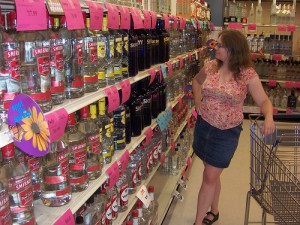Does Privatizing Retail Alcohol Sales Increase or Decrease Consumption?
If you’ve ever bought alcohol in Pennsylvania, you know what a weird, controlled system it has. As 1 of 19 “alcoholic beverage control” states in the U.S., Pennsylvania has some of the more strict, if not bizarre, laws regulating the retail sales of booze. Wine and spirits are sold only by state-owned stores, which don’t even have names; they’re designated by call numbers instead. Prices are kept uniform in all locations. Many of the stores operate at a loss. If you’re under 21, you’re not even allowed inside, and until recently, you couldn’t buy alcohol on a Sunday. Oh, and check out its “Kafka-esque” system of grocery store wine vending machines.
 Photo: Joe Shlabotnik
Photo: Joe ShlabotnikThis may all be about to change. Pennsylvania is debating whether to privatize its liquor sales as a way to raise money and bridge its budget gap. Estimates show the state could raise anywhere from $1 to $6 billion by selling off its stores to private buyers, though that would be a one-time cash infusion and the state would give up its stream of roughly $90 million in annual profits; though it would still collect sales tax revenues.
Whether that’s good fiscal policy is debatable. But so is the projected effect that privatization would have on alcohol consumption. A 2009 study by the Commonwealth Foundation, a Harrisburg, Pa. think tank, which examined the effects of deregulation in Iowa and West Virginia, found that per capita alcohol consumption decreased by as much as 5.9 percent. One explanation cited by the study’s authors, John Pulito and Antony Davies of Duquesne University, was that with more convenient hours and less restrictive purchasing guidelines, consumers bought less alcohol per trip.
But a new study refutes those findings, and shows that privatization efforts increase alcohol consumption by an average of 48 percent. The report, conducted by a task force of public health experts, analyzed 21 other privatization studies in seven states, two Canadian provinces, and two European countries. Stephen Herzenberg, an MIT-trained economist and executive director of the Keystone Research Center, reviewed the report and wrote a policy brief. The highlights of his findings:
After privatization, consumption of privatized beverages increased “substantially” (the median increase was 48.2%). Meanwhile, consumption of non-privatized beverages increased very little (the median change was a fall of 2%). Thus, overall consumption of alcohol increased a lot.
Having documented large increases in consumption with privatization, the Task Force inferred based on “extensive evidence” that “when privatization results in substantial increases in alcohol consumption, there are at the same time substantial increases in excessive consumption.” The extensive evidence referred to consists of a body of literature documenting across many societies that most people drink a small or moderate amount, while a few people drink a large amount. Since most adults drink less than once per month, and the top 10% of drinkers account for the bulk of consumption, any sizable increase in consumption means that excessive consumption must have increased. This conclusion was borne out in Finland, where, after the sale of medium-strength beer was privatized, there were increases in alcohol consumption at all levels, including among the heaviest drinkers.
From its review of the most careful studies, the Task Force finds consensus in the scientific and public health communities that privatization will increase alcohol consumption and is likely, therefore, to increase problems associated with excessive consumption.
The Commonwealth Foundation study also compared control states to license states, and found that rates of underage drinking and underage binge drinking were roughly the same. There was also no difference in alcohol-related traffic deaths in license states compared to control states, according to the study.
Washington state is also considering privatizing its state-run liquor business. In Virginia, lawmakers floated the idea earlier last year before backing away from it.
So, what do you think?
[poll id=”9″]

Comments